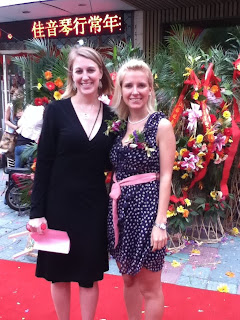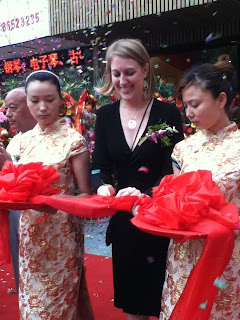Two weeks ago was my “coming out”, red carpet appearance as the Sales Executive from the Shanghai Cast Wine Company. What, what, what? Some of you may be scratching your heads and thinking, “I thought Stephanie was an English teacher at a university in China…..”. Well yes, that is indeed my day job, but China has offered both Derek and me a range of very unique job opportunities such as starring in a TV show, being a bidder of million dollar art in Beijing and pretending to be a French wine connoisseur and sales executive at the opening of a wine store in Jiang Zemin’s (former President of China) hometown of Jiangdu.
My façade as a French wine dealer began two Fridays ago when I got a text message from Johnny who initially tried to recruit me last fall to attend a similar event back then. I had been too busy in the fall but finally having some time last weekend and being intrigued by the “rent-a-foreigner” concept, I began negotiating my role in this strange business arrangement. Initially Johnny texted that I would simply have to attend a party as a guest the next day. “Very Easy!”, he wrote. As I text-negotiated the arrangement, I learned that I would actually need to arrive in Jiangdu that Friday night. That gradually became a late afternoon departure from Nanjing, but with all travel and accommodation arrangements made by Johnny and the pay I wanted agreed upon, I decided to take the plunge.
 |
| The swanky interior of the wine shop |
Five hours after the initial text message from Johnny, I was on a bus with him snacking on some KFC and learning about the details of the set-up. Johnny explained that a friend of a friend was opening a wine store in Jiangdu that sold French wine. The wine store would have special clients from the local business community and government. Those special clients would then help promote his store and wine products further in the city and also sell the wine to other customers. For such a store opening, it is customary to show appreciation to your connections by having a big shindig which is also an opportunity to celebrate the store’s opening and have friends, family, and connections wish you luck. As I have mentioned in my last
post, having foreigners at such events shows prestige and puts on an image that a company may even have connections abroad. So that was going to be my role in this entire scheme. Another Western woman had been recruited from Shanghai and I would meet her later in the evening.
 |
| With my co-wine "saleswomen", Anna |
When Johnny and I arrived in Jiangdu, we were picked up by a man who seemed to be a friend of the owner of the wine store or at least was someone who wanted to impress the owner. We’ll call him Chao. We first checked into our hotel and then there was no time to waste. Not even with a chance to drop my bag off in my room upstairs, Johnny and I were quickly shuttled to the wine store where I was taken upstairs, awkwardly introduced to the owner and his wife and another person (a client?) only to be whisked away a few minutes later to dinner in an adjacent hotel. With Johnny being my only companion in this strange arrangement, I ate dinner with the people I met at the wine store and some other folks in a private room. A poker table was set up in the corner of the room which Chinese people love to play on such company team-building and Guanxi building occasions. I thought I was going to be trapped in the room for hours on end but to my pleasant surprise, I was shuffled back to my hotel room promptly after dinner (although Chao was nowhere to be found and still had my bag in his car). For the next two hours, my planned relaxing evening turned into me researching facts and information about red wine from France and its health benefits. Johnny told me I had to be prepared to say some facts or pretend to be knowledgeable about red wine since I was likely going to be playing a representative from a Shanghai wine exporter. At around 9:30, Chao arrived in my room briefly with Anna, my fellow-foreigner at the event and then whisked her away presumably to take her to the wine store as well. Finally at 10 p.m., we were summoned to the banquet hall where the party would be held the next day. Anna was there waiting with a Chinese woman and I finally got to properly meet her. From Ukraine, Anna was getting her Masters at university in Shanghai and training to be a Chinese language teacher. Not surprisingly, her Chinese was quite fluent. Ironically she was instructed to pretend that she couldn’t speak any Chinese- a part I had no trouble playing. We sat and waited around for the next 45 minutes and finally got instruction that I would be giving a speech in English at the opening of the store the next day and that Anna would be a guest at the event. I offered to write the speech but Johnny said he needed to do it. Finally at 11 pm, Anna and I announced we were going to our rooms and would not be waiting around anymore. The next morning, I found out that Johnny was up until 1 a.m. helping with arrangements and making sure everything was perfect for the big day.
I awoke at 7 a.m. the next morning to the sound of gregarious, drunken wedding guests in the hallway outside my room. I quickly got up and got ready for the big day. I met Johnny in the hotel lobby at 8:20 and went over my role of the day. I would give a short speech in English with a line in Chinese at the opening of the store and then cut the ribbon along with the owner and a couple of other government and business hotshots.
 |
| Getting ready for my inaugural speech |
At 9 am, Anna, Johnny and I were taken by Chao to the wine store and hung around for the next hour as we waited for our important moment. Pretty Chinese girls dressed in traditional dresses that buttoned up to the neck passed out bottled water to us and other guests and pinned corsages on our dresses. Finally, our moment came and we were summoned outside. A crowd had gathered out in front of the store and curious passerby’s stopped with their children to see the “groundbreaking” event. The owner of the store gave a speech and then came my big moment! I had practiced the speech- especially the Chinese line and read it from a piece of light red paper for luck. As I stepped up to the microphone, there was some moments of awkwardness (which seemed like a full two minutes) as one of the ushers struggled to raise the microphone up to my height (which was only enhanced by the high heels I wore). Finally I gave my speech. My speech went something like this, “Chairman Cheng and esteemed guests. I am from the Shanghai Caste Wine Company. The Caste wine company started in 2000 and now it has moved to Jiangdu for its new home where it will bring much success. In Chinese “Congratulations and wishing you much luck!”. There was a lot of clapping and then the big wigs and I stepped forward to cut the ribbon.
 |
| My opening speech |
 |
| Cutting the ribbon |
We were all then driven to the hotel where the banquet was to be held. Anna and I had to sign our name in a guest book (similar to a book that might be at a wedding) and wrote our well-wishes to the company. We spent a few minutes in a conference room where men were smoking and playing poker. Finally we were brought into the banquet room and told to sit at one of the tables in the front of the room. Johnny told us some guests wanted to have their pictures taken with Anna and me so we shuffled our way to the stage for some snapshots. Soon the banquet began. One of the chairmen of the event gave a speech and then I had to give my speech again. But the best part was yet to come. Finally, waitresses came out and poured glasses of white wine for all the guests. The chairmen and another woman gave a short explanation about the wine and how to drink it, practicing such rituals like swishing it around in your mouth before swallowing it. It wasn’t long before many of our Chinese guests were pretty red in the cheeks and starting to get a little tipsy. It didn’t help that there were only plates of pistachios, some sweets and dried squid on table to eat. Eventually, round two came which was a red wine.
 |
| Peking opera singer |
The guests were quite jovial by then. The entertainment of the event started which included a woman singing a popular song from the Beijing Olympics; and then a cheesy electric violin dancer who was playing Pachebel’s Canon in D to a techno-pop beat and dancing up to some of the guests while she played. However, my favorite performance and the highlight of the banquet for me was the Peking Opera singer (who was not dressed up in costume). Seeing a man on the stage, I was taken aback and quite surprised when a high, shrill, feminine and vibrato-filled voice came out. It was really quite mesmerizing to see him so close and I learned that Jiang Zemin himself is a fan of Peking Opera since it reminds him of his youth. The particular singer at the banquet allegedly performs for Jiang Zemin whenever he is in town for any events. I was touched (probably with the aid of the wine I was drinking) when the singer turned to me after the song and said “Thank you”.
 |
| "Guanxi"-ing and "Gan bei"-ing |
The rest of the banquet seemed to be a blur. At one point I had to press a button on a computer to pick a winner for the raffle door prize and then hand a gift basket with a bottle of wine to the winner. There were several rounds of food brought out and maybe four rounds of wine poured. Like many Chinese dinners and banquets, guests at different tables were toasting one another, a ritual where everyone at a particular table stands up, wishes each other well and then drinks the rest of what’s in their glass (if people say gan bei which literally means “dry glass” and means “bottoms up!”). Sometimes a guest from one table may make the rounds to another table and toast all the people there and wish them well. This is what Anna and I had to do (all part of our job!). We stopped at the table of Chao who wanted to impress his friends. Drunkenly and in broken English he yelled out with a chuckle, “These are my friends!!” to which Anna and I gave a nod and a polite hello and a clink of the glass (I’m happy to say that he did not drive us to the bus station later).
Finally, at around 1 pm, the banquet was over as quick as it had started. There was no lingering or chit chat for Anna and me. Instead we were quickly shuffled away, picked up our stuff from our hotel and were then taken directly to the bus station. By 2 pm, Johnny and I were back on a bus to Nanjing where we both quickly crashed and fell asleep in our seats from exhaustion.
Would I do one of these events again the future? Probably not. It was pretty easy but also a little bit exhausting being shuffled around and then told to take a picture, toast a guest or say some kind words on cue. Still, Anna did say that it was an interesting glimpse into Chinese culture and the art of how relationships are formed. I definitely feel that it enriched my experience here as a foreigner in China this year. Gan bei!
For another interesting link on “Rent-a-foreigner”: